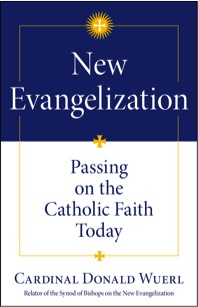 HUNTINGTON, Indiana, February 8, 2013 – Relating their faith is perhaps more vexing than ever for modern-day Catholics, who may recoil at the first challenge. Clarifying Catholicism can involve engaging those who are hostile, misinformed, disillusioned, hurt, impatient, angry, even apathetic … among many scenarios. It’s not always easy – even for the most informed Catholic – to explain the doctrine in just the right way to someone else.
HUNTINGTON, Indiana, February 8, 2013 – Relating their faith is perhaps more vexing than ever for modern-day Catholics, who may recoil at the first challenge. Clarifying Catholicism can involve engaging those who are hostile, misinformed, disillusioned, hurt, impatient, angry, even apathetic … among many scenarios. It’s not always easy – even for the most informed Catholic – to explain the doctrine in just the right way to someone else.
As the official Relator of the Synod for the New Evangelization for the Transmission of the Christian Faith, involving 250 bishops summoned worldwide by Pope Benedict XVI for the three-week meeting last October, Washington D.C.’s Cardinal Donald Wuerl has prepared an easy-to-understand summary in New Evangelization: Passing on the Catholic Faith Today (Our Sunday Visitor, 2013). In the book, Cardinal Wuerl puts forth a tactical roadmap for ordinary Catholics to ‘renew the face of the earth’ with Catholic truth.
Launching the Church’s “Year of Faith” (October 2012 – September 2013), the Synod crystalized 58 new propositions for effective “New Evangelization” – or renewed teaching of the Faith — an idea originating with Blessed John Paul II at the start of his pontificate in 1978. New Evangelization highlights those propositions and ways the everyday Catholic can apply them.
Cardinal Wuerl’s book is the first to explain the purpose of New Evangelization and what it means for Catholics today, including:
- “What’s the point?” The 3 most important priorities of the New Evangelization;
- “What am I up against?” The 3 “isms” that block society from hearing the Gospel;
- “What do I do now?” How to galvanize people around one simple truth of the Gospel;
- “Where did it all begin?” 4 theological foundations of the New Evangelization; and
- “Do I have what it takes?” The 4 characteristics of great evangelizers.
Why the New Evangelization now?
The impact of the relativistic and skeptical worldview – which is increasingly secular and even hostile to the Gospel – has washed across modern culture like a tsunami and taken with it the previously accepted societal understanding of marriage, family, objective right-and-wrong and the common good, Cardinal Wuerl explains. “This is a dangerous climate which compels the great need to repropose our Catholic faith to the world.”
In America especially, there has been an erosion of community and social structures that once supported religious values, he adds. But these challenges are windows of opportunity when people become disillusioned with the pretensions of the secular order. “For all of the difficulties it has faced and is facing, because we offer the world real hope – and the Gospel message continues to be the answer to the longings of people today – the Catholic Church in the United States is still strong.”
“There is an awakening of the Spirit in the hearts of many people, young and not-so-young,” Cardinal Wuerl says. “We repropose Christ as the answer to a world staggering under the weight of so many unanswered questions of the heart.”
“Jesus gave his first disciples the commission to bring his Gospel to the ends of the earth…That commission is now ours … and the opportunities are everywhere. By our words and witness of our lives, we can proclaim Jesus’ Good News to those who perhaps drifted away from the faith or never heard the Gospel – with family members across the dinner table, next-door neighbors, colleagues at work, even at the sidelines at children’s soccer games.” It can be done at home and abroad.
Not a man-made organization, nor a club of like-minded people, political party, or consensus, the Catholic Church is the enduring presence of Christ in the world today. Each of its members makes a free-will choice to be a member, “a choice that should change our lives,” Cardinal Wuerl says.
###





